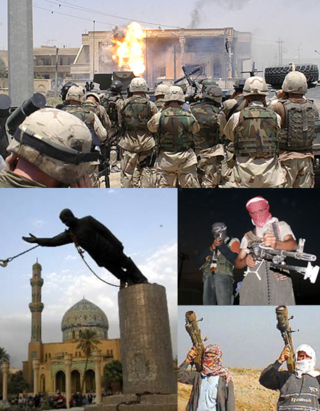The main invasion of Iraq occurred in 2003.
Other similar titled events are:
The Gulf War (1990–1991) was a conflict between Iraq and a U.S.-led coalition, following Iraq's invasion of Kuwait.
The Iraq War began in 2003 and involved a two-phase conflict comprising an initial invasion of Iraq led by U.S. and UK forces and a longer, eight-year phase of occupation and fighting with insurgents.

The 2003 invasion of Iraq was a United States–led invasion of the Republic of Iraq and the first stage of the Iraq War. The invasion phase began on 19 March 2003 (air) and 20 March 2003 (ground) and lasted just over one month, including 26 days of major combat operations, in which a combined force of troops from the United States, the United Kingdom, Australia and Poland invaded Iraq. Twenty-two days after the first day of the invasion, the capital city of Baghdad was captured by coalition forces on 9 April 2003 after the six-day-long Battle of Baghdad. This early stage of the war formally ended on 1 May 2003 when U.S. President George W. Bush declared the "end of major combat operations" in his Mission Accomplished speech, after which the Coalition Provisional Authority (CPA) was established as the first of several successive transitional governments leading up to the first Iraqi parliamentary election in January 2005. U.S. military forces later remained in Iraq until the withdrawal in 2011.

The Iraqi no-fly zones conflict was a low-level conflict in the two no-fly zones (NFZs) in Iraq that were proclaimed by the United States, United Kingdom, and France after the Gulf War of 1991. The United States stated that the NFZs were intended to protect the ethnic Kurdish minority in northern Iraq and Shiite Muslims in the south. Iraqi aircraft were forbidden from flying inside the zones. The policy was enforced by the United States and the United Kingdom until 2003, when it was rendered obsolete by the 2003 invasion of Iraq. French aircraft patrols also participated until France withdrew in 1996.
Battle of Fallujah may refer to:

The Badr Organization, previously known as the Badr Brigades or Badr Corps, is an Iraqi Shia Islamist political party and paramilitary organization headed by Hadi Al-Amiri. The Badr Brigade was the Iran-officered military wing of the Iran-based Shia Islamic party, Supreme Council for Islamic Revolution in Iraq (SCIRI), formed in 1982. The Badr Brigade was created by Iranian intelligence and Shia cleric Mohammad Baqir al-Hakim with the aim of fighting Saddam Hussein's regime during the Iran–Iraq War. Since the 2003 US-led invasion of Iraq most of Badr's fighters have entered the new Iraqi army and police force. Politically, Badr Brigade and SCIRI were considered to be one party since 2003, but have now unofficially separated with the Badr Organization now an official Iraqi political party. Badr Brigade forces, and their Iranian commanders, have come to prominence in 2014 fighting the Islamic State of Iraq and the Levant (ISIL) in Iraq. It is a part of the Popular Mobilization Forces.
Battle of Basra may refer to:
Iraqi civil war may refer to:

The Iraq War was a protracted armed conflict in Iraq from 2003 to 2011 that began with the intervention in Iraq by the United States-led coalition that overthrew the Iraqi government of Saddam Hussein. The conflict continued for much of the next decade as an insurgency emerged to oppose the coalition forces and the post-invasion Iraqi government. US troops were officially withdrawn in 2011. The United States became re-involved in 2014 at the head of a new coalition, and the insurgency and many dimensions of the armed conflict are ongoing. The invasion occurred as part of the George W. Bush administration's war on terror following the September 11 attacks.
Battle of Mosul may refer to:
Shock and awe is a military strategy based on the use of overwhelming power and spectacular displays of force to paralyze the enemy's perception of the battlefield and destroy their will to fight. Though the concept has a variety of historical precedents, the doctrine was explained by Harlan K. Ullman and James P. Wade in 1996 and was developed specifically for application by the US military by the National Defense University of the United States.
Basra is the capital of Basra Governorate, in Iraq.
Allied Bombing may refer to:
Occupation of Iraq or Iraq occupation may refer to:
Iraqi insurgency may refer to:
Desert Storm is a codename for the Gulf War (1990–1991), a war against Iraq by a U.S.-led coalition, following Iraq's invasion of Kuwait.
Hamdan Qarmat ibn al-Ash'ath was the eponymous founder of the Qarmatian sect of Isma'ilism. Originally the chief Isma'ili missionary in lower Iraq, in 899 he quarreled with the movement's leadership at Salamiya after it was taken over by Sa'id ibn al-Husayn, and with his followers broke off from them. Hamdan then disappeared, but his followers continued in existence in the Syrian Desert and al-Bahrayn for several decades.
Kyiv offensive or Kiev offensive may refer to:
The Qarmatian invasion of Iraq was a large-scale raid by the Qarmatians of Bahrayn against the Abbasid Caliphate's metropolitan region of Iraq, that began in autumn of 927 and continued until the summer of 928.
The term coalition of the willing was applied to the US-led Multi-National Force – Iraq, the military command during the 2003 invasion of Iraq and much of the ensuing Iraq War. The coalition was led by the United States.